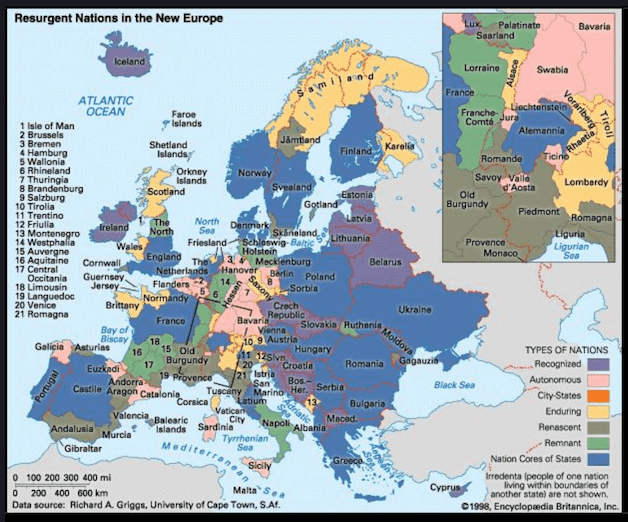

 FW-Resurgent Nations in Europe Griggs 1998 Brit Inc2017-10-28 13.08.30, Geopolitical shifts afoot in Europe
FW-Resurgent Nations in Europe Griggs 1998 Brit Inc2017-10-28 13.08.30, Geopolitical shifts afoot in Europe
I have been in a discussion with representatives of the European Council’s Regions that met in Brussel’s this week regarding their position in the European Union. The Regions are nations inside European states considering the problem of state domination verses their national identity. I am impressed by the regional efforts to clarify their political status. I suggest in my book Indigenous Nations and Modern States (2012) that “Independent Nation” is a more viable political status than pursuing UN membership which is, afterall an entity established by and for states. There are thousands of indigenous nations and peoples around the world that have political and cultural systems that are in constant conflict with states’ governments and their creations (corporations, trans-state religions, non-profit organizations and criminal syndicates). Let’s be realistic: regions, nations and peoples must set about reclaiming the international environment by establish and extending inter-national laws and defining the political status of “independent nation.” We have long been confused by political scientists from the 19th century onward when they blended nation with state as a way of validating the legitimacy of the “state.”
The truth is that when the French Revolution occurred and the nations existing in and around the Kingdom of France revolted against the crown…they created the “national assembly.” It was only after that the various nations of Europe were pushed back into regions and supplanted with states superimposed on top of them. The reemergence of nations as a specific and distinct political status must be a priority and the nations in Europe should be among those stepping forward as distinct entities. We at the Center for World Indigenous Studies are working with a number of nations that are indeed pursuing the political status of independent nation or confederated nation. To step into the UN is to step into further non-existence since the states have already demonstrated by their delaying consideration of “enabling indigenous peoples to participate in the UN” for several more general assemblies.
States feel threatened by nations since it is the nation that actually possesses the wealth on which states stand and claim power. Nations are not the junior partner that many presume, they are the founding political identity for all forms of international personality. New international norms must be created by indigenous nations themselves and that will change the international political landscape for their benefit.
Photo: Richard Griggs (1998)
The library is dedicated to the memory of Secwepemc Chief George Manuel (1921-1989), to the nations of the Fourth World and to the elders and generations to come.
access here